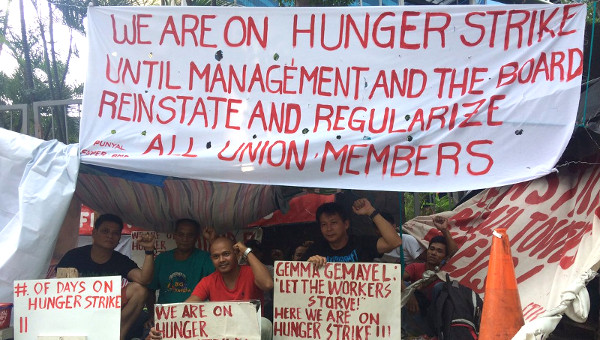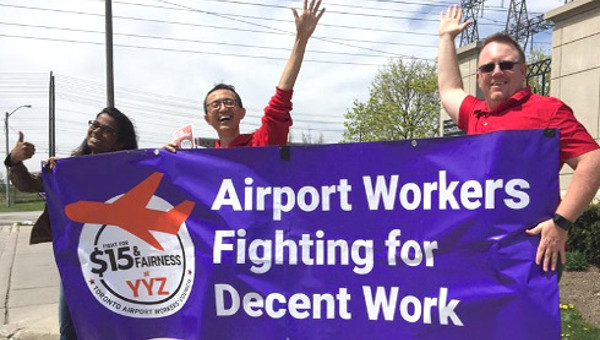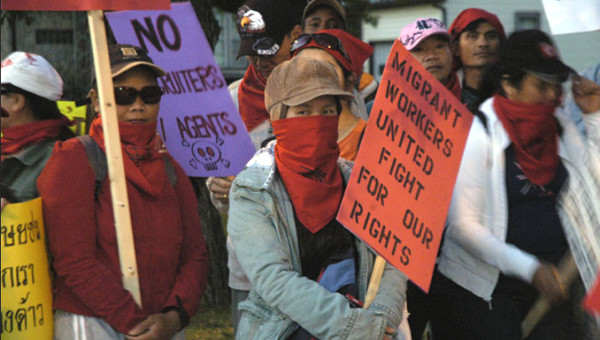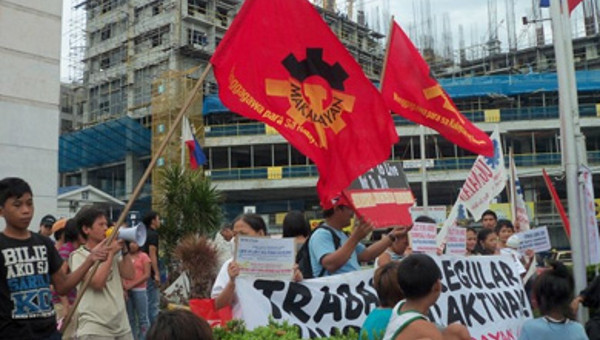From Associational to Institutional Power: the Case of Platform Workers in the Philippines
“Grab Philippines, Respect Our Rights! Recognise Our Union and Negotiate With Us!” rang out in Angeles City during the public launch of the National Union of Food Delivery Riders (formerly known as United Delivery Riders of the Philippines; henceforth, the riders’ union) on January 25, 2023. In attendance were the Grab riders who formed it, foodpanda riders sympathetic to their cause, a representative from the Department of Labour and Employment of the Philippines, and various unions under the umbrella of the Sentro ng mga Nagkakaisa at Progresibong Mangagawa (SENTRO – Center of United and Progressive Workers).
SENTRO, a labour centre representing more than 80,000 private, public, and informal members, has been supporting riders’ organising for some time. Before this public launch, platform delivery riders in General Santos City and Iloilo City launched their own unions. They were followed by riders from Cagayan de Oro City. SENTRO supported the spontaneous strikes and the delivery riders in their grievances and built local chapters with the aim of forming a national union of delivery riders.
Drawing on my fieldwork and existing research, I want to introduce the organising experience of Grab delivery riders in the Philippines and SENTRO’s role in supporting their spontaneous strikes and organising efforts. I conclude by looking at the current political opportunities for platform delivery workers to change their conditions.
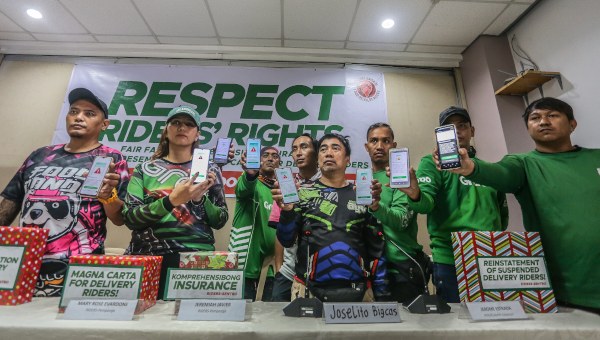
Essential and Expendable
According to Fairwork Philippines, there are more than 40,000 Grab Food/Express workers in the Philippines out of the more than 400,000 workers on all the platforms studied.1 When the 2020 pandemic lockdowns began in the Philippines, delivery riders facilitated the continuing distribution of goods for a population severely limited in mobility. According to Rakuten Insight, 57% of their respondents used food delivery apps more as of June 2020.2
Even as other businesses suffered from economic downturns, platforms continued to expand. According to Business World, Grab Philippines began operating in areas adjacent to the capital, Manila (Laguna, Tarlac), and even those farther away (General Santos City, Albay, Butuan, Agusan del Norte). Its Food and Beverage sales increased by 61% in 2020.
Platform delivery riders’ status as essential workers or front liners during the pandemic was recognised in various Senate bills and executive actions. As early as July 2020, Senator Lito Lapid filed a bill protecting delivery riders from fake bookings, in recognition of the risks that their job entailed.3
Despite their essential status, however, platforms failed to meet all the criteria for fair working conditions.4 Fairwork Philippines’ 2022 report assessed nine platforms, including Grab Car and Grab Food/Express, based on five principles: fair pay, fair conditions, fair contracts, fair management, and fair representation. I highlight pay, conditions, and management below.
Fairwork Philippines reported that none of the nine platforms they studied guaranteed at least the minimum wage for platform workers, including both ride-hailing and delivery workers, when the costs of performing their tasks (e.g., fuel, maintenance) were included in the computation. They also noted that earnings of at least the minimum wage required working for more than eight hours a day.
Moreover, Fairwork Philippines’ assessment of platform workers’ conditions awarded one out of two points for Grab Car and Grab Food/Express for efforts to reduce the risks faced by the riders on the road. For example, Manulife offered Grab and Lalamove Riders free insurance coverage during the early months of the lockdowns. (See here and here.)
Despite their independent contractor status, delivery riders lack government-mandated safety nets. In the Philippines, regular workers and their employers are required to share contributions to various safety nets such as the Social Security System (pension system for private employees), PhilHealth (assistance for healthcare expenses), and PAG-IBIG (housing loans). Though Grab launched efforts in 2022 to enrol their delivery workers on these platforms, they have offered only to subsidize a small group’s first month of contributions. Thus, Grab delivery riders, treated as independent contractors, are still not entitled to this shared contribution. Given the risk of road accidents and possible COVID-19 infection, the lack of social protection is an affront to their well-being.
Finally, Fairwork Philippines found insufficient evidence that any of the nine platforms upheld fair representation. None of the platforms’ explicit policies support collective bargaining. This lack of worker participation in the platform’s governance may create discrepancies between how the platform evaluates and pays worker performance and the actual conditions on the ground. As well, the discrepancies between the real distance travelled and the app-measured distance would take on a new sense of urgency with rider representation.5
Moreover, during the pandemic, exclusive villages closed their gates to delivery riders, fearing they could spread the virus. Some driver respondents spoke of being asked to walk, as motorcycles were barred from entering, or they were made to wait for lengthy periods for the customer to meet them at the village gate. Long waiting times mean fewer opportunities for bookings and earnings. Encouraging representation could prevent issues like that from being overlooked.
Facing insufficient pay, lack of social protection, and no representation despite recognition of their essential status, delivery drivers were nevertheless considered essential and expendable.6
But they are now pushing back through union building.
Self-Directed Action and Union Resources
Since 2020, the grievances generated by platform work have created islands of contention in many parts of the archipelago. In November 2020, a couple of months after lockdowns began in the Philippines, Grab bikers called on the platform to provide an equitable distribution of orders between them and motorcycle riders. In the same month, foodpanda riders also protested in front of the Department of Labour and Employment in Manila against the revised fare matrix implemented by the platform.
One of the more contentious cases came from Davao City, where a group of foodpanda riders planning a log-off was suspended for ten years by the platform. The platform would later claim this was a system glitch (see here, here, here, and here for additional context). A case was filed at the National Labour Relations Commission and was resolved in favour of the foodpanda riders in July 2022. The company was instructed to pay back wages and other benefits to seven riders – a partial victory since 50 were initially suspended and only ten filed cases. The decision is not yet final as it could still be appealed, in stages, right up to the Supreme Court of the Philippines. Nevertheless, the mobilisation and subsequent success of these workers are significant, given that the Philippines has been consistently cited as one of the worst places for workers in the world.7
Other concerns include the limitations on bargaining capacities for informal workers, the fragmentation of the labour movement, and a policy of industrial peace.8 It is within this context that SENTRO supported the grievance-driven contentiousness with their organizational resources, aiming to build associational power for Grab riders and other platform workers.9 Associational power derives from the workers’ capacity to organise themselves to advocate for their interests and pressure decision-makers. This could be through unionization, setting up demonstrations, or building political parties.
According to Henry (Author’s Note: all the names of the interviewees have been changed to protect privacy.), a direct participant in the organising campaign of SENTRO, the labour centre provided legal advice early on to workers making inquiries on their Facebook page during the pandemic. This served as the trigger for Sentro to conduct an investigation into the conditions of the platform delivery workers and to begin the process of organising a union for them. SENTRO’s member unions provided the strategy and funding to commence organising and the legal know-how to navigate Philippine labour law.
The result is the steady building of the National Union of Food Delivery Riders. Local chapters are being founded with the goal of forming a national union. Interestingly, their organizational structures sometimes differ. Some chapters are exclusively for Grab delivery riders, such as the one from Pampanga. Others are composed of foodpanda riders and Maxim riders, as in General Santos City.
The Pampanga chapter exhibits how SENTRO supported the building of associational power. First, SENTRO provided logistical support and media coverage to amplify the calls of Grab riders for better working conditions. The unity ride before the formal public launching of the Pampanga chapter was documented for publication on Facebook, and some media outlets were present to interview one of the riders’ union leaders there. These kinds of initiatives help build public awareness and support for delivery riders. They also have a demonstrative effect on other rider groups that could benefit from SENTRO’s resources. The visibility of contention against platforms can sometimes prompt other groups to reach out to SENTRO.
Second, SENTRO informed delivery workers of their legal rights under the Philippine Constitution and provided legal support when workers were required to speak with the platforms through the arbitration of the Department of Labour and Employment. One of the first steps in their organising process is attending a Basic Orientation Seminar (BOS) and then transitioning into training about Basic Trade Unionism (BTU). My conversations with delivery riders across various platforms organised by SENTRO point to the effectiveness of arming them with legal knowledge. The Filipino word Karapatan, or rights, is frequently invoked to justify their fight. Manuel, a Grab rider with a pivotal role in organising his sector, told me about his job termination: My termination happened because Grab’s Code of Conduct is against our Constitutional right to rally; their code of conduct says we cannot rally wearing Grab’s uniform.
Third, SENTRO’s legal knowledge and networks legitimated the building of unions for delivery workers. During the public launch in Pampanga, representatives from unions in manufacturing, food, and logistics affiliated with SENTRO were there to express their support. Representatives from other riders’ union chapters from General Santos, Cebu, Iloilo, Cagayan de Oro, and the National Capital Region were also present in person or via Zoom. They all talked about their organising experience and the lessons they drew from it. Their speeches reinforced their common identity of being workers and unionists. The presence of a representative from the Department of Labour and Employment also showed the riders that their actions did not constitute anything illegal.
Lastly, SENTRO, on a national level, provided the opportunity for delivery workers to formulate their demands coherently. Rather than a top-down process of imposition, SENTRO was attentive to ensuring that their program reflects the problems and aspirations on the ground.
According to Henry, the union advocates for the following demands: 1) Just and sufficient earnings based on a fare matrix from delivery riders, 2) Due process in suspensions and bans, 3) Insurance for accidents, sickness, and death, 4) Laws that will protect Freelance Delivery Riders, and 5) The right to form a union and to negotiate.
Kris, one of the organisers of SENTRO, told me that this set of demands was formulated through a meeting of organisers and delivery workers deliberating on possible programs that could respond to their general demands. This set of demands is then presented to the attendees of seminars they organise for feedback.
From Associational Power to Institutional Power
What political opportunities are there for the National Union of Delivery Riders to transform their growing associational power into institutional power? One opportunity, albeit indirectly related, due to the Supreme Court of the Philippines promulgating a judgment in favour of Lazada Delivery Riders, declaring them to be regular employees by virtue of the so-called four-fold test and economic dependency test used to determine the employee-employer (as opposed to an independent contractor) relationship in the Philippines.
The four-fold test looks into “(a) the employer’s selection and engagement of the employee; (b) the payment of wages; (c) the power to dismiss; and (d) the power to control the employee’s conduct, the most important factor” while the economic reality test considers various factors such as the economic dependence of the worker on the company (see paragraph 9-10 of the previous article).
While Lazada is not a food delivery service, it is a platform for selling products delivered directly to consumers’ homes. It shares affinities with Grab and foodpanda as platform companies. This and the recent judgment from the National Labour Relations Commission regarding Davao foodpanda riders suggest that there is space in the Executive and Judicial branches of government to push back against the claims of independent contractor status for delivery workers.
Aside from claiming employee status for platform delivery workers, another legislative opportunity is the formal definition of the rights and responsibilities of platform freelancers. Several measures have already been filed in the Philippine Senate to protect platform delivery workers. Senator Risa Hontiveros filed Senate Bill 1373 aimed at requiring at least a minimum wage for freelancers and transparency in algorithmic decision-making, as well as enshrining due process in decision-making, mandating a contribution to social protection programs in the Philippines (e.g. SSS, PhilHealth, PAG-IBIG) and guaranteeing the right to organise.10
SENTRO’s more extensive network includes the AKBAYAN Party, from which Senator Hontiveros hails. The Senator sent a video message explaining the bill to the unionists during the Pampanga public launch. Union members also attended senate hearings to express their views. Platform delivery workers attend such hearings with the assistance of SENTRO.
Local governments in the Philippines are also starting to notice the plight of delivery workers and are trying to improve their working conditions. Valenzuela City already has an ordinance mandating safe spaces, gadget charging, and sanitizing stations for delivery riders, initiated as early as 2021. Meanwhile, in General Santos City, the local legislative council held hearings to discuss an ordinance granting social protection to delivery workers in the locality. Cebu City had a session for an ordinance granting safe places for delivery riders as they wait for orders. These local governments’ efforts are commendable, but the national government needs to adopt similar measures to ensure similar standards across the Philippine archipelago.
There are genuine political opportunities for delivery workers to use their associational power to create institutional changes in labour laws in the Philippines. But how this will play out is still dependent on the speed with which the Philippine legislature passes regulations on the platforms, the response of the platforms themselves regarding the organising of gig-workers, and the capacity of SENTRO and the union to exert pressure from below while lobbying in the halls of power.
Conclusion
Despite Grab delivery riders’ status as front liners or essential workers during the pandemic, they were still considered expendable. This is apparent in their pay challenges, insufficient social protection measures, and lack of worker representation. SENTRO’s union resources supported the riders’ grievance-driven contentions. This synergy led to the founding of the National Union of Delivery Riders by providing logistical and media resources, legal education, union legitimation, and assistance in forming a coherent set of demands. Now, Grab delivery riders have a genuine opportunity to transform their associational power into institutional power. Nevertheless, this transformation would be the outcome of the power struggles among the state, delivery platforms such as Grab, and the delivery workers’ union.
What does the experience of the National Union of Delivery Riders say about organising platform delivery workers? Assistance from ‘traditional’ unions reduces organising costs for contentious platform delivery workers. Labour systems today are steeped in various regulations that govern relationships between the state, capital, and labour, often requiring technical knowledge to navigate. Moreover, precarity provides disincentives to participate and organise, given the need to sell one’s labour to the market just to survive.11 Reducing the cost of participation by sharing resources is essential to hasten the mobilisation of a labour movement able to challenge the prerogatives of platform companies.
Once a labour movement has been mobilised, the task shifts to maintaining and enhancing its associational power to bring institutional reform to completion. National legislative action will take time because of the length of the process and the shifting currents of public opinion. Moreover, platforms resisting efforts to regulate them would also contribute to delays. Attempting to argue against the proposed regulations, Uber warns of price hikes if regulations protecting workers are passed in Europe. In Spain, where one of the first laws protecting platform delivery workers was passed, Glovo continues to be fined because of its resistance to the legislation. Strategies are needed that continuously make apparent the benefits of unionization even if the desired institutional regulation is likely to happen far into the future. When the institutional mechanisms are put up, associational power remains important to ensure that companies and the state live up to the standards.
One strategy for this is mobilising locally for changes that ease working conditions. Local government officials are relatively easier to access and they rely on a narrower voter base than national officials. A large organised group of riders at the city or municipal level would readily draw the attention of these officials. As mentioned earlier, local government officials could create ordinances that require establishments to provide parking spaces and charging stations or even mandate social safety nets. Improving on these conditions could readily demonstrate the positive effects of unionization.
Another strategy is to learn from the experience of mutual aid groups that have sprung up among delivery riders. These mutual aid groups provide pooled monetary assistance for members in accidents, for discipline-erring delivery riders, and for monitoring the implementation of local ordinances that benefit them. Israel, an unaffiliated delivery rider, recounted how he got some establishments fined because they failed to provide parking spaces required by a local ordinance. He also related an incident when he called the attention of a delivery rider to the need to return the payment to a fast-food worker who mistakenly thought the order would be paid online. Issues such as this emerge in the day-to-day fulfilment of delivery workers’ tasks. A union that is engaged in smoothing out conflicts in the workplace will have its importance recognised by workers. •
This article first published on the Asian Labour Review website.
Endnotes
- Cheryll Ruth Soriano et al., Towards Fair Labor Conditions in the Philippine Platform Economy: Philippines Ratings 2022 (Philippines: Fairwork, 2022), 15.
- Rakuten Insight, “Changes on the Use of Food Delivery Apps during COVID-19 Pandemic in the Philippines as of June 2020 [Graph].,” Statista, accessed March 27, 2023.
- Manuel “Lito” Lapid, “Food and Grocery Delivery Services Protection Act,” Senate of the Republic of the Philippines, July 8, 2020.
- Soriano et al., Towards Fair Labor Conditions in the Philippine Platform Economy: Philippines Ratings 2022, 18.
- Cheryll Ruth Soriano et al., “The Rise of Worker Protests in the Philippine Platform Economy Spotlights Unfair Work Conditions,” Fairwork, October 17, 2022.
- Kritika Pandey, Rhacel Salazar Parreñas, and Gianne Sheena Sabio, “Essential and Expendable: Migrant Domestic Workers and the COVID-19 Pandemic,” American Behavioral Scientist 65, no. 10 (September 2021): 1292.
- International Trade Union Confederation, 2023 ITUC Global Rights Index: The World’s Worst Countries for Workers (Brussels, Belgium: International Trade Union Confederation, 2020.
- Philip F. Kelly, “The Political Economy of Local Labor Control in the Philippines,” Economic Geography 77, no. 1 (2001): 1–22; Rene E. Ofreneo, “Precarious Philippines: Expanding Informal Sector, ‘Flexibilizing’ Labor Market,” American Behavioral Scientist 57, no. 4 (2013): 420–43; Christopher Erickson et al., “From Core to Periphery? Recent Developments in Employment Relations in the Philippines,” Industrial Relations: A Journal of Economy and Society 42, no. 3 (2003): 368–95.
- Stefan Schmalz, Carmen Ludwig, and Edward Webster, “The Power Resources Approach: Developments and Challenges,” Global Labour Journal 9, no. 2 (2018): 118.
- Risa Hontiveros, “An Act Regulating Work Mediated, Organised, or Allocated Through Online Platforms for the Protection of Philippine Workers in the Gig Economy,” Senate of the Republic of the Philippines, October 6, 2022.
- Søren Mau, Mute Compulsion: A Marxist Theory of the Economic Power of Capital (Verso Books, 2023).


